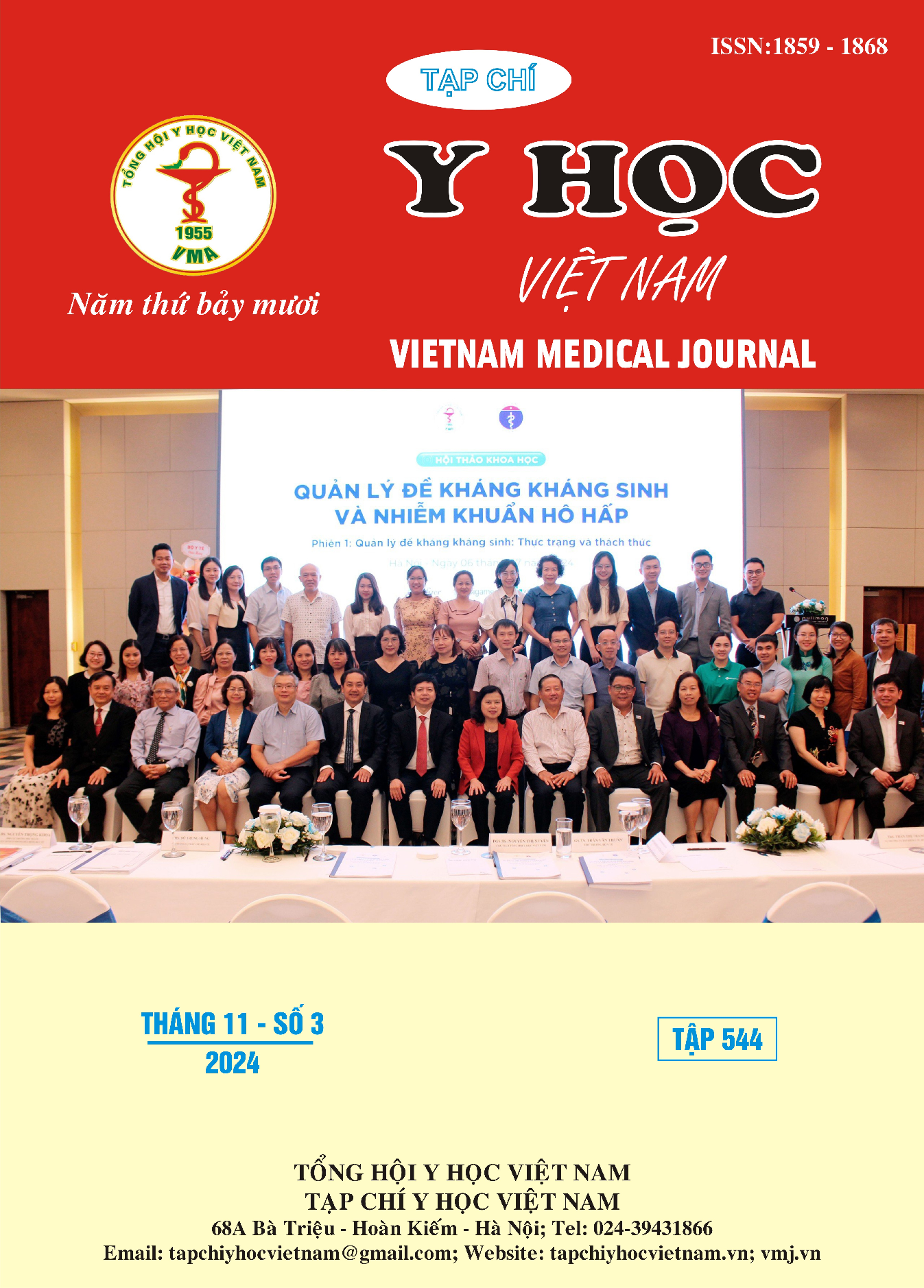FACTORS AFFECTING OUTCOMES OF TCF INDUCTION CHEMOTHERAPY FOLLOWED BY CONCURRENT CHEMORADIOTHERAPY IN STAGE III-IVA NASOPHARYNGEAL CARCINOMA AT VIETNAM NATIONAL CANCER HOSPITAL
Main Article Content
Abstract
Objective: To evaluate certain factors affecting the treatment outcomes of TCF induction chemotherapy followed by concurrent chemoradiotherapy in patients with stage III-IVA nasopharyngeal carcinoma at Vietnam National Cancer Hospital. Subjects and Methods: A retrospective descriptive study was conducted on 40 patients diagnosed with stage III-IVA nasopharyngeal carcinoma, who received TCF induction chemotherapy followed by concurrent chemoradiotherapy at Vietnam National Cancer Hospital from January 2019 to December 2020. Results: The 3-year progression-free survival (PFS) and overall survival (OS) rates were 77.5% and 87.5%, respectively. The 3-year PFS for stage III patients was significantly higher compared to stage IV patients (76.3% versus 50%), p = 0.031. Disease stage was an independent prognostic factor. Age, radiotherapy techniques, and treatment response did not statistically significantly affect PFS and OS. Conclusion: For patients with stage III and IVA nasopharyngeal carcinoma, TCF induction chemotherapy followed by concurrent chemoradiotherapy is an appropriate treatment option with relatively high survival outcomes. Disease stage is an independent prognostic factor influencing treatment outcomes.
Article Details
Keywords
: nasopharyngeal carcinoma, induction chemotherapy, concurrent chemoradiotherapy, survival time, TCF, influencing factors
References
2. Guidelines Detail. NCCN. Accessed August 2, 2024. https://www.nccn.org/guidelines/ guidelines-detail?category=1&id=1437
3. Sun Y, Li WF, Chen NY, et al. Induction chemotherapy plus concurrent chemoradiotherapy versus concurrent chemoradiotherapy alone in locoregionally advanced nasopharyngeal carcinoma: a phase 3, multicentre, randomised controlled trial. Lancet Oncol. 2016;17(11):1509-1520. doi:10.1016/S1470-2045(16)30410-7
4. Zhang Q, Wang Y, Liao JF, et al. Long-Term Survival and Prognostic Factors in Locoregionally Advanced Nasopharyngeal Carcinoma Patients Treated with TPF Induction Chemotherapy followed by Cisplatin-Combined Concurrent Chemoradiotherapy. J Cancer. 2019;10(17):3899-3907. doi:10.7150/jca.31663
5. Al-Sarraf M, LeBlanc M, Giri PG, et al. Chemoradiotherapy versus radiotherapy in patients with advanced nasopharyngeal cancer: phase III randomized Intergroup study 0099. J Clin Oncol Off J Am Soc Clin Oncol. 1998;16(4): 1310-1317. doi:10.1200/JCO.1998. 16.4.1310
6. Pan JJ, Ng WT, Zong JF, et al. Proposal for the 8th edition of the AJCC/UICC staging system for nasopharyngeal cancer in the era of intensity-modulated radiotherapy. Cancer. 2016;122(4):546-558. doi:10.1002/cncr.29795
7. Ng WT, Lee MCH, Hung WM, et al. Clinical outcomes and patterns of failure after intensity-modulated radiotherapy for nasopharyngeal carcinoma. Int J Radiat Oncol Biol Phys. 2011;79(2):420-428. doi:10.1016/j.ijrobp.2009.11.024
8. Shim HJ, Kim HJ, Hwang JE, et al. Long term complications and prognostic factors in locally advanced nasopharyngeal carcinoma treated with docetaxel, cisplatin, 5-fluorouracil induction chemotherapy followed by concurrent chemoradiotherapy: A retrospective cohort study. Medicine (Baltimore). 2020;99(49):e23173. doi:10.1097/MD.0000000000023173


